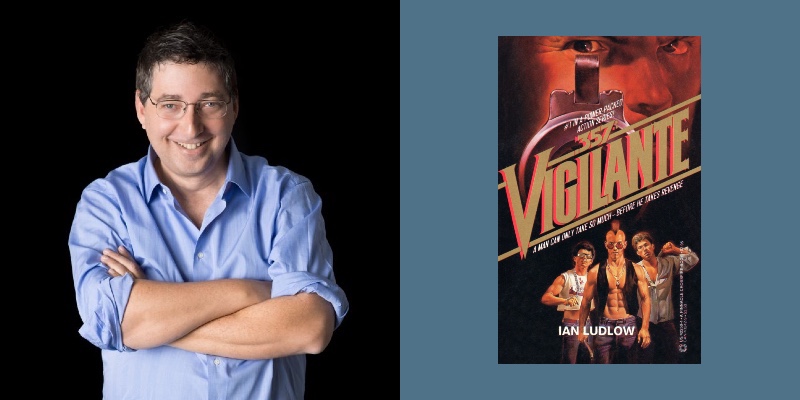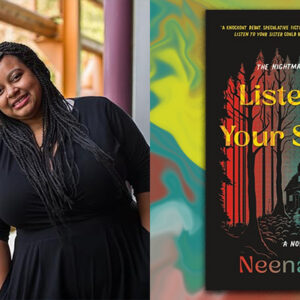Novelist and television writer Lee Goldberg looks askance at luck in the publishing world.
“You make your own luck,” he says. “I put myself in a position for ‘luck’ to happen. I learned about the business of writing by interviewing screenwriters and authors for articles I sold to newspapers and magazines to pay my college tuition. I hung out with other aspiring writers, some of whom who later became successful. And I befriended my journalism professor, who gave me my big break. I got the knowledge, and made the contacts, that allowed the ‘good luck,’ to happen.”
Networking is always important to a career because it creates opportunities if you’re ready to take them, and Goldberg was certainly prepared when they arrived. The result has been a career as a bestselling crime author, television writer, and producer.
He always wanted to write. He can’t remember when it wasn’t his passion. He used his mother’s old typewriters to punch out stories in grade school to circulate among his friends––that’s right, grade school. After a few years, he started his own newspaper, the Cochise Courier – named after the cul-de-sac where his family lived – and wrote stories about his neighborhood. He sold it for a nickel a copy. In high school and college, he edited the student newspapers. He also wrote a thinly disguised, very bad, series of novels based on Simon Templar and The Saint series. His first unpublished novel, The Perfect Sinner, may have been awful, he says, but he learned a lot from it.
Lee Goldberg was barely a teen. These are experiences aspiring writers often undertake far beyond grade school. He was so young, he might have started writing in the womb had he had pen and paper at the time. For his entire life, he has lived his writing passion, and it has opened all size and shapes of doors for him. The difference between his passion then and now? “It hasn’t changed, but I think I dress a little better.”
He loves to talk. Conversation is words and Lee Goldberg loves words, especially those that evoke humor. He’s downright funny, even when he repeats his best lines.
In high school, while living in the San Francisco Bay area, he began earning money for college by interviewing celebrities for different publications. He was maybe sixteen at the time and did his interviews over the phone. Lee used his best anchorman voice, which he’d learned from his father – a local television news anchorman. None of the famous caught on they were talking to a kid.
Years later, when he was studying journalism at UCLA, he was interviewing television producer Stephen J. Cannell (The Rockford Files, The A Team, The Greatest American Hero, and more), when he let it slip he was now in Los Angeles. Cannell, who had talked with him previously while Goldberg was living in San Francisco, invited Goldberg to the studio to meet in person.
“Now, he’s going to discover I’m a kid,” Goldberg says. “I was terrified. I knew the moment I walked into his office, he was going to feel deceived. So, I asked him a tough financial question about his independent production company to prove I was a serious journalist. He was knocked on his ass by it, but he took me seriously and we were fine. I interviewed him many times after that.”
Years later, after Goldberg and Cannell had become friends, Goldberg asked how he felt when the fledgling student walked into his office. “Oh, I felt sure I’d been conned,” Cannell told him. “I thought you were angling for a job.” Ironically, when Goldberg became an executive producer on Diagnosis Murder, he actually hired Cannell as an actor.
Goldberg’s parents divorced when he was a teen and his mother, a local socialite, took a job writing a society column for the local East Bay Times newspaper, switching from going to parties to make a splash, to going to parties to make a salary. She met a guy one evening at a party and flew off to Santa Barbara with him, so she called her young son and asked if he could quietly write her next column from notes she’d left on her desk in the newsroom.
He was familiar with her writing style, so he slipped into the newspaper late at night, read her notes, and filed her column for the next day.
“No one could tell from the way I wrote it that it wasn’t her.” So, his mother started leaving town more often and counting on him to file her copy, he says, trailing off with a hint of exasperation.
“I resented her for it, but it turns out she did me a big favor. She taught me how to write in someone else’s voice,” he says, which later helped him tremendously with his television writing and also his novels.
His ability to interview adults, make a snap decision to defuse an age issue with Cannell, and to mimic his mother’s column writing style so perfectly that no one noticed, show a maturity beyond his years. Yet Goldberg maintains his boyish sense of humor even to this day (noting on his website, and in innumerable interviews, he sleeps in “Man From U.N.C.L.E.” pajamas).
He attended UCLA and put himself through college freelancing for the Los Angeles Times Syndicate, UPI, Newsweek and American Film magazine. His girlfriend at the time worked at Playgirl magazine and got him a job writing sexually explicit letters-to-the-editor at $25 a clip.
During all this, he was also writing for UCLA’s college newspaper, The Daily Bruin. There, he befriended his journalism advisor, Lewis Perdue, who was also writing thrillers on the side.
“Lew showed me his manuscripts and I gave him my opinion,” Goldberg says. “I really had no life experience at age 18, but I’d read lots of thrillers and had plenty of opinions.” But his words were true enough that Perdue listened to his ideas. When Perdue’s publisher asked him to write a men’s action series – the male equivalent of a Harlequin romance – Perdue turned him down. “He said, ‘no,’ but he knew someone who would do it. And he recommended me”
“I needed to come up with a men’s action-adventure series, so I needed to educate myself. Writing is one of the few professional careers where you can be entirely self-taught – if you pay attention.”
He went to the chair of the UCLA Communications Department and was granted class credit for his new sideline. He dug into the genre and turned it into a research paper for a grade, while also writing the book.
“I wrote books in class, during lectures, and at night – whenever I could.”
His first novel, .357 Vigilante, was published while he was still in college. It’s a story about a Brett Macklin, a young man whose father, a cop, is brutally murdered by a gang. Macklin seeks revenge, going after each gang member one by one. He says it has elements of Death Wish and covers all of the genre’s archetypes and tropes about an ordinary man thrust into an extraordinary adventure.
“But I wanted it to be literature. I wanted to be the next John Irving or Larry McMurtry.” So, he made his protagonist impotent. “I thought this would give my character enormous depth,” he says, laughing about it today. His editor was not pleased.
“Are you out of your mind?” the editor railed. “Not only is he having sex, he’s having amazing sex!”
“I had no choice, I had to rewrite it, but I was furious.” So, Goldberg wrote some ridiculously, insanely athletic sex scenes and soon gets a call from his editor. Goldberg was sure he was about to get fired. But his editor said: “Not only were your sex scenes hot, they were real.”
“I was relieved, but also horribly depressed,” Goldberg says. “Because if those were real sex scenes, I was the worst lover on the planet.”
His debut novel exploded onto the bestseller list, partially due to timing. .357 Vigilante arrived the same week Bernhard Getz, the so-called Subway Vigilante, shot four black youths on a New York subway. New World Pictures quickly picked up the film rights and Goldberg was hired to write the script, and his screenwriting career was born.
Goldberg had signed a four-book deal and finished three of them when his publisher, Pinnacle, went bankrupt. He never received a dime of royalties for .357 Vigilante, and it took him fifteen years to get his rights back. He’s since republished the book under a new title, Judgment.
The writer, whose passion for his profession is off the scale, said his first publishing experience wasn’t all bad. “I had to learn to work with an editor,” and he learned a lot about book marketing. One marketing gimmick he used was his pen name, Ian Ludlow – after Ian Fleming and Robert Ludlum – so he would be on bookstore shelves next to Ludlum.
And his timing is often impeccable. For example, his novel Dream Town was about Chilean burglary tourists breaking into L.A. homes that face open spaces like parks, hillside and golf courses. Shortly before the book was published, a gang tried to break into his home… while he was there. He caught it all on his security cameras and the event made national news. Maybe Goldberg needs to stage his crimes farther away from L.A., like maybe the Mojave Desert?
His first published novel, he says, “was awful. I look at it now and I cringe. But I can see the writer I would become in there.”
His many early novels, “were written when I was teenager. Of course, they suck compared to the New York Times bestsellers I’m writing now. I didn’t have the knowledge or the failures I’ve learned from… I came from Walnut Creek, California. I didn’t know anybody. You have to make your own luck.”
Fortunately, he says, “I’m still getting royalties from books I wrote when I was eighteen.” Goldberg has lived his passion for more than forty years, and nothing says it better than that.
___________________________________
.357 Vigilante
___________________________________
I want to be a writer: From the womb.
Experience: Student newspapers, celebrity interviews and features in numerous publications, mother’s gossip column. Began writing in grade school.
Writing Time: Three months
Agents Contacted: One. His professor’s agent.
Time to Sell Novel: None. His professor signed on as guarantor with the publisher. If Goldberg failed to deliver, his professor would have written it.
First Novel Agent: Mel Berger, William Morris Agency
First Novel Editor: I don’t remember, it was years ago!
First Novel Publisher: Pinnacle
Inspiration: “I have no idea. I always wanted to be a writer and I’ve been a veracious reader.” Fletch, by Gregory Macdonald, was his wakeup call. “It was driven entirely by dialogue. I can do this, I thought. It was a revelation to me and made me believe I could be novelist or screenwriter.”
Advice to Writers: Read. You can learn so much from good books and bad books. Go back and reread them and figure out how it moved you. The magic is all right there to be seen. Take the books you like apart and find out why they work. Do the same with books you don’t like.
Website: LeeGoldberg.com
Author Photo by Ron Scarpa
Like this? Read the chapters on Lee Child, Michael Connelly, Tess Gerritsen, Steve Berry, David Morrell, Gayle Lynds, Scott Turow, Lawrence Block, Randy Wayne White, Walter Mosley, Tom Straw. Michael Koryta, Harlan Coben, Jenny Milchman, James Grady, David Corbett. Robert Dugoni, David Baldacci, Steven James, Laura Lippman, Karen Dionne, Jon Land, S.A. Cosby, Diana Gabaldon, Tosca Lee, D.P. Lyle, James Patterson, Jeneva Rose, Jeffery Deaver, Joseph Finder, Patricia Cornwell, Lisa Gardner, Mary Kubica, Hank Phillippi Ryan, I.S. Berry, Heather Graham, and John Gilstrap, J.D. Barker, and Kate White.

















